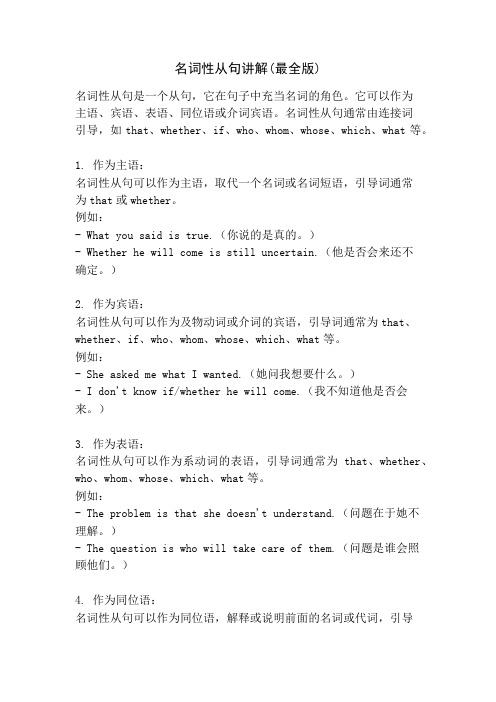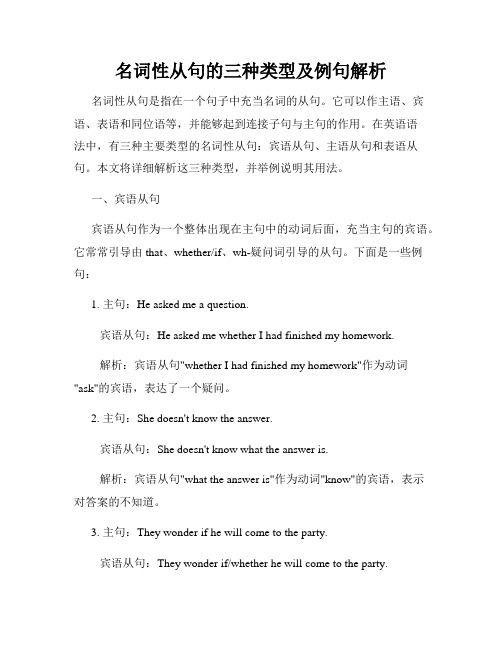名词性从句用法详解
名词性从句讲解(最全版)

名词性从句讲解(最全版)名词性从句是一个从句,它在句子中充当名词的角色。
它可以作为主语、宾语、表语、同位语或介词宾语。
名词性从句通常由连接词引导,如that、whether、if、who、whom、whose、which、what等。
1. 作为主语:名词性从句可以作为主语,取代一个名词或名词短语,引导词通常为that或whether。
例如:- What you said is true.(你说的是真的。
)- Whether he will come is still uncertain.(他是否会来还不确定。
)2. 作为宾语:名词性从句可以作为及物动词或介词的宾语,引导词通常为that、whether、if、who、whom、whose、which、what等。
例如:- She asked me what I wanted.(她问我想要什么。
)- I don't know if/whether he will come.(我不知道他是否会来。
)3. 作为表语:名词性从句可以作为系动词的表语,引导词通常为that、whether、who、whom、whose、which、what等。
例如:- The problem is that she doesn't understand.(问题在于她不理解。
)- The question is who will take care of them.(问题是谁会照顾他们。
)4. 作为同位语:名词性从句可以作为同位语,解释或说明前面的名词或代词,引导词通常为that、whether、who、whom、whose、which、what等。
例如:- The fact that he lied surprised me.(他撒谎的事实让我感到惊讶。
)- His belief that she will succeed is unwavering.(他坚信她会成功。
名词性从句的用法

名词性从句的用法名词性从句是在句子中充当名词的成分的从句。
名词性从句可以作为主语、宾语、表语或补语,常见的名词性从句有宾语从句、主语从句、表语从句和同位语从句。
1. 宾语从句(Object Clause):宾语从句在主句中充当宾语的角色。
一般引导宾语从句的词包括that, whether, if, why, how, when, where, who, whom 等。
示例:I don't know where he lives.(我不知道他住在哪里。
)2. 主语从句(Subject Clause):主语从句在句子中充当主语的角色。
常用的引导词有that, whether, if, what, who, which, where, how 等。
示例:What she said surprised me.(她说的话让我很惊讶。
)3. 表语从句(Predicate Nominative Clause):表语从句在句子中充当表语的角色。
一般由连词that 或whether 引导,也可以由who, whom, whose, which 等引导。
示例:His dream is that he can become a famous singer.(他的梦想是成为一名著名的歌手。
)4. 同位语从句(Appositive Clause):同位语从句用来解释、说明和限制先行词的意义。
它与先行词之间往往用连词that 或whether 连接。
示例:The news that he had won the prize made everyone happy.(他获奖的消息让大家都很高兴。
)。
名词性从句的用法和特殊引导词和名词性从句在句子中的位置和作用

名词性从句的用法和特殊引导词和名词性从句在句子中的位置和作用名词性从句的用法和特殊引导词以及名词性从句在句子中的位置和作用名词性从句是指在句子中充当名词的从句。
它可以作主语、宾语、表语、同位语等,在英语中被广泛应用。
本文将介绍名词性从句的用法以及特殊引导词,并探讨名词性从句在句子中的位置和作用。
一、名词性从句的用法名词性从句可以用来代替句子中的名词,并在句中担任特定的语法角色。
主要有以下几种用法:1. 主语从句:名词性从句作主语,位于主句的动词之前,如:- What you said is true.(你说的是真的。
)- Whether she will come is still unknown.(她是否会来仍然是未知的。
)2. 宾语从句:名词性从句作及物动词或介词后的宾语,如:- I don't know what to do.(我不知道该怎么办。
)- They asked me where I was going.(他们问我要去哪里。
)3. 表语从句:名词性从句作连系动词后的表语,如:- The most important thing is that you are safe.(最重要的是你平安。
)- My wish is that everyone can live a happy life.(我的愿望是每个人都能过上快乐的生活。
)4. 同位语从句:名词性从句作另一个名词的同位语,如:- The fact that he made a mistake surprised everyone.(他犯了一个错误这个事实令人惊讶。
)- Her belief that honesty is the best policy is well-known.(她认为诚实是最好的策略,这一观点很有名。
)二、特殊引导词名词性从句有一些特殊的引导词,根据从句的不同用法选择相应的引导词。
以下是常见的特殊引导词:1. 作主语从句的引导词:- that: He said that he would come.(他说他会来。
名词性从句的三种类型及例句解析

名词性从句的三种类型及例句解析名词性从句是指在一个句子中充当名词的从句。
它可以作主语、宾语、表语和同位语等,并能够起到连接子句与主句的作用。
在英语语法中,有三种主要类型的名词性从句:宾语从句、主语从句和表语从句。
本文将详细解析这三种类型,并举例说明其用法。
一、宾语从句宾语从句作为一个整体出现在主句中的动词后面,充当主句的宾语。
它常常引导由that、whether/if、wh-疑问词引导的从句。
下面是一些例句:1. 主句:He asked me a question.宾语从句:He asked me whether I had finished my homework.解析:宾语从句"whether I had finished my homework"作为动词"ask"的宾语,表达了一个疑问。
2. 主句:She doesn't know the answer.宾语从句:She doesn't know what the answer is.解析:宾语从句"what the answer is"作为动词"know"的宾语,表示对答案的不知道。
3. 主句:They wonder if he will come to the party.宾语从句:They wonder if/whether he will come to the party.解析:宾语从句"if/whether he will come to the party"作为动词"wonder"的宾语,表达了对他是否会来参加派对的疑问。
二、主语从句主语从句作为一个整体出现在句子的最前面,充当主句的主语。
它通常由that引导,也可以由wh-疑问词引导。
以下是一些例句:1. 主句:It is important to learn a foreign language.主语从句:That she is a hardworking student is important.解析:主语从句"That she is a hardworking student"作为句子的主语,强调了她是一个勤奋的学生的重要性。
名词性从句用法详解

I think it is because you are doing too much.我想这是因为你做得太多。
连接代词
what
which
who
whom
whose
什么
哪一
谁
谁
谁的
主语
表语
宾语
定语
宾补
The problem is who we can get to replace her.问题是我们能找到谁去替换她呢。
It’s a pity that we can’t go.很遗憾我们不能去。
It’s no surprise that our team should have won the game.我们没赢这场比赛真意外。
3)It+be+过去分词(said, reported, thought, expected, decided, announced, arranged, etc.)+that从句。
whoever
whatever
whichever
无论谁
无论什么
无论哪一
主语
表语
宾语
定语
宾补
She will give whoever needs help a warm support.凡需要帮助的人,她都会给予热情的支持。
Eat whichever one you like and leave the others for whoever comes in late.喜欢吃哪一个就吃哪一个,把其余的留给进来迟的。
How this happened is not clear to anyone.这事怎样发生的,谁也不清楚。
英语名词性从句讲解【完整版】

2、I asked him if he could do me a favor .
If与whether的区别:
1、If不能引导放于句首的主语从句,而whether可以。 2、引导表语从句用whether,不用if。 3、引导同位语从句用whether,不用if。 4、whether可以引导从句作介词的宾语,不用if 。 5、whether or not 连在一起可以,但if不可以。而 “whether-----or not = if -----or not”
同位语从句:
定义:在复合句中充当同位语的句子。 同位语从句用来对其前面的抽象名词进行解释说明,被解释说明的词和 同位语在逻辑上是主表关系。 同位语常见名词:fact, suggestion, advice, idea, decision, news, thought, hope, belief, truth, doubt, promise, possibility, truth, warning, message, reason, report, question,explanation, wish, problem等。 常见的连接词:that, whether, what, who, how, when, where等。 用法: The thought that I want to buy my mother a birthday gift makes me excited.that 引导的同位语从句,解释说明 thought,从句不缺成 分 There is some doubt whether he will come. whether 引导同位语从句,if 不能引导同位语从句 we haven’t made the decision where we are going to spend our vacation. 有时同位语从句可以不紧跟解释说明的名词后面。 The news is surprising that he won the match.
名词性从句的用法解析
名词性从句的用法解析名词性从句是英语语法中的一种特殊结构,它在句子中扮演名词的角色。
名词性从句可以作主语、宾语、表语和补语,它的引导词通常包括“that”、“whether/if”、“wh-”疑问词以及“whoever”、“whatever”、“whichever”等。
1. 名词性从句作主语名词性从句可以作整个句子的主语,常见的引导词是“that”和“whether/if”:例句1:That he is late again is a disappointment to me.例句2:Whether/if she will attend the meeting is still uncertain.2. 名词性从句作宾语名词性从句可以作及物动词或介词的宾语,常见的引导词有“that”、“whether/if”以及wh-疑问词:例句1:He doesn't know whether/if he should accept the job offer.例句2:I doubt that they will arrive on time.例句3:She is worried about what will happen tomorrow.3. 名词性从句作表语名词性从句可以作句子中的表语,常见的引导词有“that”、“whether/if”以及wh-疑问词:例句1:His main concern is that he won't have enough time to finishthe project.例句2:The question is whether/if she can handle the responsibility.4. 名词性从句作补语名词性从句可以作某些动词的表语补语,通常以“that”引导:例句1:She considered it necessary that he should apologize.例句2:He made it clear that he didn't want to participate in the discussion.需要注意的是,在名词性从句中,有时候可以省略连词或引导词,尤其是在口语中。
完整版)名词性从句用法归纳
完整版)名词性从句用法归纳名词性从句是指在句子中作名词角色的句子,可以充当主语、宾语、表语、同位语、介词宾语等。
名词性从句包括主语从句、宾语从句、表语从句和同位语从句。
引导名词性从句的连接词可以分为三类。
第一类是从属连词,包括that、whether和if。
在宾语从句或表语从句中,that 有时可以省略。
第二类是连接代词,包括what、who、which 等。
这些代词在从句中做成分,不可以省略。
第三类是连接副词,如when、where、how等,也不可以省略。
在一些情况下,that可以省略,如定语从句中做宾语、引导宾语从句或表语从句时。
但在定语从句中做主语、由that引导同位语从句时,以及宾语从句中真正的that不可以省略的情况下,that不能省略。
主语从句是指作句子主语的从句。
主语从句通常由从属连词that、whether等,连接代词what、who、which等,以及连接副词how、when、where等引导。
2、连接词的使用:连接词在句子中起到连接的作用,其中that在句子中没有实际的意义,只是起到连接从句和主句的作用。
而连接代词和连接副词则在句子中既保留了自己的疑问含义,又起到连接从句和主句的作用,同时在从句中充当从句的成分。
例如,whom和who指人,what指物,而XXX和whoever则表示泛指意义。
举个例子,What he wants to tell us is not clear.表示他想告诉我们什么并不清楚。
另外,为了避免句子头重脚轻的情况,有时我们会用形式主语it代替主语从句,并将主语从句放在句末。
这种情况下,主语从句后的谓语动词一般使用单数形式。
常用的句型有:(1)It + be +名词+ that从句,如It is a fact that(事实是);(2)It + be +动词的过去分词+ that从句,如It is said that(据说);(3)It +不及物动词(vi)+ that从句,如It seems that (似乎);(4)It + be +形容词+ that从句,如It is naturalthat(很自然)。
名词性从句的语法解析
名词性从句的语法解析名词性从句是指在句中充当名词的成分的从句,可以作主语、宾语、表语、同位语等。
名词性从句的引导词有“从属连词”和“连接代词”两种。
一、主语从句主语从句在句中充当主语,常引导主语从句的连接词有“that”和“whether/if”。
其中,“that”在口语中常省略,而“whether/if”则一般用于句中有“or not”时。
例如:1. That he passed the exam is good news.(非正式:He passed the exam is good news.)2. Whether he will come to the party is still uncertain.(非正式:If he will come to the party is still uncertain.)二、宾语从句宾语从句在句中充当宾语,常引导宾语从句的连接词有“that”、“whether/if”、“what”和“who/whom”。
其中,“that”在口语中常省略。
例如:1. She said that she would go shopping later.(非正式:She said she would go shopping later.)2. I don't know whether/if he is coming to the party.(非正式:I don't know if he is coming to the party.)3. She asked me what I wanted for dinner.4. He asked who/whom I was talking to on the phone.三、表语从句表语从句在句中充当表语,常引导表语从句的连接词有“that”、“whether/if”和“what”。
例如:1. The important thing is that we are safe.(非正式:The important thing is we are safe.)2. The question is whether/if he will pass the exam.3. The problem is what we should do next.四、同位语从句同位语从句通常用来进一步解释说明某个名词或代词指代的内容,引导同位语从句的连接词有“that”、“whether/if”、“what”、“who/whom”等。
高中英语知识点归纳名词性从句的用法
高中英语知识点归纳名词性从句的用法名词性从句是英语中一个重要的语法结构,它可以在句子中充当名词的作用。
名词性从句可以作主语、宾语、表语和同位语等,它的引导词有很多种,比如that, whether, who, whom, whose, which, what, when, where等。
本文将对名词性从句的用法进行归纳总结。
1. 名词性从句作主语名词性从句作主语时,常用it代替整个从句,并将从句放在句子的后面。
例如:It is important that we learn English well.(我们学好英语很重要。
)2. 名词性从句作宾语名词性从句作宾语时,常与一些动词或介词搭配使用。
例如:I believe that he will come.(我相信他会来。
)She is not sure whether he likes her or not.(她不确定他是否喜欢她。
)They asked me what time the train would leave.(他们问我火车什么时候开。
)3. 名词性从句作表语名词性从句作表语时,常用it代替整个从句,并将从句放在句子的后面。
例如:The important thing is that we try our best.(重要的是我们尽力。
)4. 名词性从句作同位语名词性从句作同位语时,修饰前面的名词,起进一步说明或解释的作用。
例如:The fact that he lied surprised me.(他撒谎的事实使我吃惊。
)除了以上几种常见的使用方式,名词性从句还有一些特殊的用法。
5. 名词性从句与疑问词连用名词性从句与疑问词连用时,疑问词可以是关系代词或关系副词,例如:I don't know who will come.(我不知道谁会来。
)Please tell me where you were last night.(请告诉我你昨晚在哪里。
- 1、下载文档前请自行甄别文档内容的完整性,平台不提供额外的编辑、内容补充、找答案等附加服务。
- 2、"仅部分预览"的文档,不可在线预览部分如存在完整性等问题,可反馈申请退款(可完整预览的文档不适用该条件!)。
- 3、如文档侵犯您的权益,请联系客服反馈,我们会尽快为您处理(人工客服工作时间:9:00-18:30)。
高一语法专题:名词性从句在句子中起名词作用的从句叫名词性从句。
名词性从句的功能相当于名词词组,它在复合句中能担任主语、宾语、表语、同位语,因此根据它在句中不同的语法功能,名词性从句又可分为主语从句、宾语从句、表语从句、同位语从句。
引导名词性从句的词叫做连接词,包括:1. 连词(在名词性从句中只起连接作用,不作成分)2. 连接代词(在名词性从句中作主语、宾语或表语)3. 连接副词(在名词性从句中作状语)I 主语从句:是在主句中作主语的从句。
它由连接词引导,通常位于谓语动词之前。
连接词:1. 连词:在从句中不充当任何成分,常见的引导主语从句的连词有that, whether。
That he got the first prize excited him much.他获得一等奖一事使他非常兴奋。
It is doubtful whether we can get there on time.我们能否按时到达那儿还不确定。
1)that引导的主语从句:在从句中不作任何成分,也没有实际意义。
一般情况下that不可省略。
That light travels in straight lines is known to all.众所周知,光沿直线传播。
That you don't like him is none of my business.你不喜欢他不关我的事。
2)whether引导的主语从句:常置于句首,表示“是否”之意;Whether he can finish his task on time is of greatimportance.他是否能按时完成任务非常重要。
Whether you can succeed or not depends on howhard you work at it.你能否成功取决于你努力的程度。
2.连接代词:在从句中起名词或代词的作用,常作从句的主语、宾语、表语或定语,有具体意义且不能省略。
常见的连接代词有who, whom, whose, what, which,whoever, whomever, whatever, whichever。
What we should do with the problem is undecided.我们如何处理这个问题还未作出决定。
(what引导主语从句,不表疑问意义)Whom the letter was from is still unknown.这封信是谁邮寄的还不清楚。
3.连接副词:在从句中起副词的作用,常作从句的状语,表示时间、地点、原因、方式等。
常见的连接副词有when, where, how, why, whenever, wherever, however等。
Why he did that wasn't quite clear.他为什么做那件事还不十分清楚。
Where we can look up his address is still a problem.我们在哪儿可以查他的地址还是个难题。
注意:it代替主语从句作形式主语that从句作主语通常用it作形式主语,而将that从句置于句末。
常见的it替代主语从句的句式主要有以下几种:1)It + 系动词 + 形容词 + that从句It is quite clear that the whole project is doomed to failure.很清楚,整个计划注定要失败。
It is likely that there will be a snowstorm tomorrow.明天很可能会有一场暴风雪。
2)It + 系动词 + 名词 + that从句常见的用于此结构的名词有:a pity(遗憾),a shame(遗憾,耻辱),a fact(事实),an honor(荣耀),a wonder(奇迹),no wonder(难怪),good news(好消息)等。
It's no wonder that you've achieved so much success.难怪你已取得了如此大的成功。
It's a pity that you didn't attend their wedding.你没有参加他们的婚礼真是遗憾。
3)It + 系动词 + 动词的过去分词 + that从句It is said that no passengers were injured in the accident.据说在那次意外事故中没有乘客受伤。
It is announced that the plan has been successfully carried out.据宣布计划已被顺利实施。
4)It + 特殊动词+ that从句常用于这种结构的动词有:seem(看上去),appear(显得),happen (碰巧),matter(关系重大),turn out(结果),occur to sb. (某人突然想起)等。
It seems to me that he objects to the plan.在我看来,他好像反对这个计划。
It happened that I met an old friend on the street yesterday.昨天我碰巧在街上遇见了一位老朋友。
II 宾语从句:在主句中起宾语作用的从句称为宾语从句。
宾语从句可分为动词的宾语从句、介词的宾语从句和形容词的宾语从句。
1. 连词that, if/ whether引导的宾语从句引导宾语从句时,that, whether/if 都只起连接作用,在从句中不作任何成分。
that无实义,在句子中可以省略;wether/if 意为“是否”,不可省略。
He said (that) he couldn't finish his work before dusk.他说黄昏之前他完不成任务。
Nobody knows whether/ if he likes school or not.没有人知道他是否喜欢上学。
注意:whether/ if都意为“是否”。
一般情况下,它们可以互换,口语中常用if,但在以下情况中,只能用whether:1)与or not 紧接连用时。
如:Let me know whether or not you can come.请让我知道你是否能来。
2)作介词的宾语从句时。
如:We are interested in whether you will attend the meeting.我们对你是否会参加会议感兴趣。
3)引导主语从句、表语从句与同位语从句时4)在动词不定式前时。
如:I don’t know whether to go.2. 连接代词引导的宾语从句who, whom, what, which, whomever, whoever, whatever, whichever等引导宾语从句,并且在宾语从句中充当主语、宾语、表语、定语等成分, 每个连接代词都有自己特定的意义,一般不省略。
Do you know who is in charge of the company你知道谁负责这家公司吗(作主语)Can you tell me which boy is your son你能告诉我哪个是你儿子吗(作定语)What do you think his job is你认为他是干什么工作的(作表语)3.连接副词引导的宾语从句when, where, why, how, whenever, wherever, however等引导宾语从句,并且在宾语从句中充当状语,表示时间、地点、原因、方式等。
(有时how much, how many等也可引导宾语从句。
每个连接副词都有自己特定的意义,一般不省略。
)The police asked me how the accident happened.警察问我事故是怎么发生的。
(方式状语)I don't know when we will meet again.我不知道我们何时才能再见面。
(时间状语)Do you know where Mr. Brown lives你知道布朗先生住在哪儿吗(地点状语)使用宾语从句的注意事项1.宾语从句的语序:在宾语从句中要用陈述句语序。
He asked me when we could set out the next day.他问我第二天什么时候可以出发。
Did you find out where she lost her car你查出她在哪里丢的车了吗2.宾语从句的时态:1)如果主句的谓语是一般现在时,其宾语从句的时态可以是任何适当的时态。
She says (that) she works from Monday to Friday.她说她周一至周五上班。
(从句时一般现在时)She says (that) she will leave a message on his desk.她说要在桌子上留个便条。
(从句是一般将来时)She says (that) she has never been to Mount Emei.她说她从来没有去过峨眉山。
(从句是现在完成时)2)如果主句的谓语是一般过去时,其宾语从句的时态一般要用适当的过去时态(客观真理、事实除外)He said there were no classes yesterday afternoon.他说昨天下午没有课。
(从句是一般过去时)He said that he was going to take care of the baby.他说他会去照看这个婴儿。
He said that they were having a meeting at that time.他说他们那时正在开会。
(从句是过去进行时)3)当宾语从句是表达客观真理和规律的句子时,其时态仍用一般现在时。
The teacher told us that nothing is difficult if we put our heart into it.老师告诉我们,世上无难事,只怕有心人。
He said that light travels much faster than sound.他说光比声传播得快。
解题技巧:1. 动词find, feel, think, consider, make, believe, guess, suppose, assume等后有宾语补足语时,则要用it作形式宾语,而将that宾语从句后置。
I think it necessary that we take plenty of boiled water every day.我认为每天多喝开水是有必要的。
